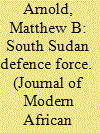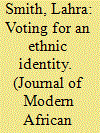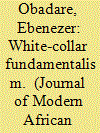|
|
|
Sort Order |
|
|
|
Items / Page
|
|
|
|
|
|
|
| Srl | Item |
| 1 |
ID:
080054


|
|
|
|
|
| Publication |
2007.
|
| Summary/Abstract |
This paper investigates a paradoxical case of business success in one of the world's worst-governed states, Angola. Founded in 1976 as the essential tool of the Angolan end of the oil business, Sonangol, the national oil company, was from the very start protected from the dominant (both predatory and centrally planned) logic of Angola's political economy. Throughout its first years, the pragmatic senior management of Sonangol accumulated technical and managerial experience, often in partnership with Western oil and consulting firms. By the time the ruling party dropped Marxism in the early 1990s, Sonangol was the key domestic actor in the economy, an island of competence thriving in tandem with the implosion of most other Angolan state institutions. However, the growing sophistication of Sonangol (now employing thousands of people, active in four continents, and controlling a vast parallel budget of offshore accounts and myriad assets) has not led to the benign developmental outcomes one would expect from the successful 'capacity building' of the last thirty years. Instead, Sonangol has primarily been at the service of the presidency and its rentier ambitions. Amongst other themes, the paper seeks to highlight the extent to which a nominal 'failed state' can be successful amidst widespread human destitution, provided that basic tools for elite empowerment (in this case, Sonangol and the means of coercion) exist to ensure the viability of incumbents.
|
|
|
|
|
|
|
|
|
|
|
|
|
|
|
|
| 2 |
ID:
080055


|
|
|
|
|
| Publication |
2007.
|
| Summary/Abstract |
The footwear sector in Ethiopia is dominated by cheap imports from Asia, particularly from China. This has inflicted heavy impacts on the sector, and threatened its competitiveness in the domestic market. This study examines the impact of imports and coping strategies of firms to withstand the competition. Firm level data were gathered from micro, small and medium footwear enterprises. The findings revealed that Chinese shoes are superior in design, price and quality, with the result that they have taken over the domestic market. The impact of Chinese imports on local producers varied from downsizing, bankruptcy, loss of assets and property, to downgrading activities and informalising operations. Firms have pursued coping strategies that focused on improving design and quality, as well as lowering prices and profit margins. Coping strategies appear to be differentiated by size of firms, and have some association with the performance of firms. The ways forward for local producers should focus on collaborative engagements of stakeholders and government to overcome the competitive disadvantages of firms. Training, technology, quality control, benchmarking and reorganization of production should be designed as a package of intervention. In addition, strengthening local producers to engage in collective actions and promoting exports should also be given proper attention
|
|
|
|
|
|
|
|
|
|
|
|
|
|
|
|
| 3 |
ID:
080050


|
|
|
|
|
| Publication |
2007.
|
| Summary/Abstract |
Despite stipulations in the Sudan's 2005 Comprehensive Peace Agreement (CPA) that all 'other armed groups' be demobilised by January 2006, the South Sudan Defence Force (SSDF) continued to maintain a significant armed presence in South Sudan. This paper analyses the dynamics of the organisation, the impact of its ongoing presence on the security situation and reconstruction efforts, and attempts by the government of South Sudan to counteract the SSDF from January to August 2006. It argues that the strategies implemented by the government to counter the SSDF were fairly successful in that there was no major return to conflict. However, it concludes that the SSDF's continued presence, while hindered, has the potential to spark a return to civil war
|
|
|
|
|
|
|
|
|
|
|
|
|
|
|
|
| 4 |
ID:
080053


|
|
|
|
|
| Publication |
2007.
|
| Summary/Abstract |
The literature on democratisation in diverse and divided societies suggests that procedural and institutional innovations can help create the conditions for democracy by adjudicating among groups with competing claims for recognition and inclusion. Some of the most critical assumptions about the relationship between ethnic identity and formal political institutions have been tested in Ethiopia since the early 1990s. Ethnic federalism is a unique and controversial attempt to account for the contested nature of ethnic identities in contemporary Ethiopian politics through a variety of mechanisms, including the use of a referendum to determine ethnic identity. In 2001 the Siltie people voted to separate from the Gurage ethnic group. With this political manoeuvre, the Siltie accessed greater levels of political power and greater resources, but also recognition under the constitutional arrangement as a distinct ethnic group. The Siltie case suggests that formal political institutions have a limited, though important, role in resolving contested citizenship claims. At the same time, it raises vital questions about the challenges of procedural solutions in the context of contested citizenship and democratic transition in sub-Saharan Africa
|
|
|
|
|
|
|
|
|
|
|
|
|
|
|
|
| 5 |
ID:
080052


|
|
|
|
|
| Publication |
2007.
|
| Summary/Abstract |
Economic crisis and structural adjustment in Ghana have put large numbers of formal sector employees and civil servants out of work. This informalisation process has gendered consequences. Unemployed people, rural-urban migrants and school-leavers of both genders seek employment in the urban informal economy, and increasingly take up 'female' occupations - particularly in retail trade. Overcrowding in women's economic domains thus occurs. This study examines the livelihood strategies of informally employed men and women in Accra. It is argued that gender ideologies regarding appropriate occupations for women and men are continuously adapted in response to a changing political economy. Thus, even if female traders face competition, declining returns and a heavier dependency burden, frustration with government policies failing to create decent jobs (for men) is more prevalent than gender antagonism and ridicule of those who find gender-atypical ways of eking out a living.
|
|
|
|
|
|
|
|
|
|
|
|
|
|
|
|
| 6 |
ID:
080051


|
|
|
|
|
| Publication |
2008.
|
| Summary/Abstract |
Home historically to a politically engaged youth sector, Nigeria has, over the past two decades, witnessed a growing incidence of religious extremism involving educated youth, especially within university campuses. For all its important ramifications, and despite the continued infusion of social and political activity in the country by religious impulse, this phenomenon has yet to receive a systematic or coherent treatment in the relevant literature. This paper aims to locate youthful angst displayed by Nigerian university students within the context of postcolonial anomie and the attendant immiseration of civil society. Youth religious extremism on Nigerian campuses reflects both young people's frustration with national processes, and their perceived alienation from modernity's 'cosmopolitan conversation'
|
|
|
|
|
|
|
|
|
|
|
|
|
|
|
|
|
|
|
|
|